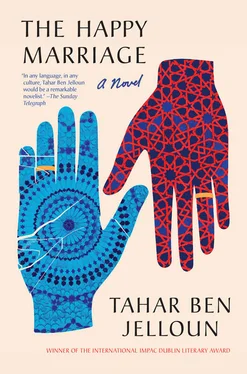The painter woke up at five in the morning and cursed that infernal bed where he’d fallen asleep.
Dawn was breaking, he pulled out the oxygen tubes, turned the water on in the shower, and watched it run over his body, which was turning gray and black. He wasn’t dreaming anymore, he was hallucinating.
That stay in the hospital, where he’d had such a near brush with death, had strangely left the painter feeling calm and collected.
The illness had left him very enfeebled, and the side effects caused by the parasite took a long time to vanish entirely. Nevertheless, the painter went on with his life and left the house when he wanted, as if he wasn’t ill anymore. He would walk to his studio, which was situated in the 14th arrondissement, quite a distance from his place. He had a commission from Barcelona’s City Hall to commemorate the Universal Declaration of Human Rights, but he was having trouble getting started. One morning, when he’d woken up more tired than usual, his wife had driven him to his studio. During the drive, he’d softly asked her if she could come pick him up around five o’clock. Quite unexpectedly, she’d blown up at him: “I’m not your chauffeur and this isn’t your taxi. You know, I’ve been your nurse for over a month now! Who do you think you are? Do you think the universe revolves around you? You’re taking advantage of the fact that you’re sick, so don’t count on me anymore!”
They’d been on Rue d’Alésia at the time. The painter had flown into a rage and had retorted: “If that’s the case then I’m happy to walk.” She’d suddenly slammed on the brakes and opened the door. He’d climbed out of the car and had walked to his studio on his own.
That incident definitely capsized their married life. Clashes followed and neither of them resembled their former selves anymore. He had his share of responsibility in that whole affair. His weakness, his naïveté, his illusions, and then that eternal hope that she would one day change. To avoid bickering with her, he’d begun to flee the house for secret rendezvous with more loving women, women who admired him both as an artist and as a man. He found a great deal of comfort with those women and a kind of sweetness that he really needed. Those secret relationships helped to keep him balanced and avoid abruptly leaving his house. The children were happy, they loved him and cuddled him. Henceforth, his happiness would take place in different places and different times, but never in the same place, there was never any continuity. He thought he could reconcile all these differences and lead a double life without ever jeopardizing that oft-mentioned equilibrium.
Things were going so badly between them that he convinced her to go to couples’ therapy with him. “I’m not crazy! If I’ve consented to go with you, it’s to show your psychiatrist how crazy, perverse, and monstrous you are!” is what she’d hit him with just before their appointment. She’d looked at him with eyes full of resentment in the waiting room.
The psychiatrist had explained how the sessions would work before beginning. She hadn’t cared about any of that. She had launched into a tirade in front of that stranger about the horrors of their married life, comparing the painter to an ayatollah who wanted his wife to live in purdah, sought to prevent her from leading her own life, gave his children’s money away to his brothers and sisters, traveled all the time for his work; he was basically a ghost husband … “He’s never there! After our children were born, I was forced to assume two roles, those of the father and the mother. I do everything I can to make sure they still love him, even though he’s literally abandoned them, but he doesn’t care; he always uses the excuse that he has to go work in his studio, that he has to travel for his exhibitions, and so we never see him. And when he does come back, he’s always in a bad mood, he shouts, screams, and hits the children!”
He gave the psychiatrist his version of events, which was a lot simpler: “For some time now we haven’t had the same idea of what married life should be like, nor the same philosophy on education; her family interferes too much and makes her choices for her, and I’m not allowed to say anything about it. What she’s told you really doesn’t match reality. I’m sorry, she’s not playing the same game here, she refuses to examine herself, while I’ve come here because I have doubts and because I’d like us to have some couples’ therapy!”
She canceled the following session and reproached him for having exploited the situation in order to criticize her family, which she couldn’t stand at all.
A month later, the painter went to see the psychiatrist on his own. He was a chubby guy with an olive complexion who wore red-framed spectacles. He had dandruff on his shoulders, which snowed down from his full head of hair. He’d given the painter a knowing look that seemed to say: “I knew you’d come back!” He let the painter speak and then interrupted him.
“—I’m going to let you in on a secret, something I’ve rarely done and which is hardly professional. My name isn’t Jean-Christophe Armand, I’m just as Moroccan as you or your wife. My name is Abdelhak Lamrani and I was born in Casablanca. I attended medical school in Rabat and specialized in Paris. I had wanted to practice in my own country, in Morocco, but there are too many misconceptions about my field over there. Too many people think that going to see a psychiatrist means you’re crazy. But let’s get back to your case. Your wife didn’t come here because she wants to change things. She came because she thinks you’re deranged, while she’s in perfect mental health. She’s completely wrong, of course, but I’m unable to help people who aren’t yet ready for therapy. For that reason, couples’ therapy isn’t advisable at this present moment. So, what should I advise you to do? Divorce? Separate? Resign yourself? Run away? You’re going to have to be the one to make that choice. It’s yours and yours alone. The problems will always be there. People never really change. That’s not my opinion, it’s the wisdom of the ancients. Good luck.”
VIII. Marrakech, April 3, 1993
Three bourgeois women swap stories of their hallucinations:
— I lifted the lid and saw a great precipice and the limpid waters of a stream.
— Before sitting down an eagle flew over me!
— The wind hurled dead leaves in my face.
— LUIS BUÑUEL, The Exterminating Angel
The painter had always promised himself he would one day retrace Delacroix’s footsteps in Morocco. The spring had been bathing the country in its light when he’d decided to buy a plane ticket for Marrakech. He’d brought pencils and brushes with him, just as he’d done as a young man. No other luggage. He got himself a room in a little hotel not far from Jamaa el Fna square and telephoned one of his friends, who was a writer and lived in the medina. The writer immediately invited him to come over. He introduced the painter to two cultivated women, who were also staying in town for a while. One of them was in her fifties, and she was slender and a chain-smoker. The other was clearly a lot younger, and what was more, she was pretty and voluptuous. She didn’t talk much, but the other one talked for her. The first was called Maria and the other Angèle. There were at least thirty years between them. Maria worked for a multinational company and was always traveling. The painter had liked talking to her almost immediately, as she knew a lot about Morocco. When they’d parted ways, they’d agreed to meet the following day at the hotel where they were staying. The women wanted to give him a book they’d written, The Origins of Indian Art in Latin America , which was bound to interest him. Maria was from Argentina, while Angèle was a Catalan living in Guatemala.
Читать дальше












